Euronews Green brings you the latest updates from the UN climate conference in Baku, Azerbaijan.
Follow along with our live coverage of COP29 here. From our team at home and in Baku we'll be sharing the biggest news from day three of the UN climate summit.
 ADVERTISEMENT
ADVERTISEMENT
 ADVERTISEMENT
ADVERTISEMENT

 ${title}
${title}
Live ended
It's getting late in Baku and we're wrapping up our coverage of COP29 for now as things wind down. Before we go here's what you missed today:
- A new report found that global carbon emissions are set to hit a record high in 2024 - and there's "no sign" of a peak in fossil fuels.
- Albanian PM Edi Rama went off script to give an impassioned speech. He questioned the point of the climate talks if big polluters continue with business as usual.
- Over the last two days, world leaders have outlined the harsh reality of extreme weather in their countries - each story worse than the last. It paints a stark picture of the impact of climate change around the world.
- Brazil presented its new national climate plan with a commitment to cut emissions from 2005 levels by 59 to 67 per cent by 2035.
- After "unacceptable" comments from Azerbaijani President Ilham Aliyev, French minister for the ecological transition Agnés Pannier-Runacher said she will no longer be travelling to Baku next week.
- We heard from climate activists in Baku about why they are still fighting for progress at the UN climate conference.
That's all from us. See you bright and early tomorrow morning for the latest from Baku.
Climate activists explain why they’re not giving up in ‘dark times’
Geopolitical events have cast a long shadow over this year’s conference, but climate campaigners are determined to keep going in “dark times”.
German climate activist Luisa Neubauer and Asad Rehman, executive director of War on Want, share their thoughts from Baku.
“There are moments when acceleration is possible,” Luisa says. “When we have reached social tipping points, when suddenly - like in 2019 - elections are being won through the climate. And there are times like these, where it's harder to see the hope, where it's easier to fall for cynicism.”
‘Dark times’: Climate activists on why they’re still fighting at COP29
Cutting through the noise at COP29, Luisa Neubauer and Asad Rehman tell us what brings them to Baku.
French minister for the ecological transition pulls out of climate talks in Baku
French Minister for the Ecological Transition, Energy, the Climate and Risk Prevention Agnès Pannier-Runacher will not be travelling to Baku next week as previously planned.
"The remarks made against France and Europe by President Aliyev on the occasion of the opening of COP29 are unacceptable," Pannier-Runacher said.
"Direct attacks against our country, its institutions and its territories are unjustifiable. Azerbaijan is instrumentalizing the fight against climate change for its own unworthy personal agenda. These attacks constitute a flagrant violation of the UNFCCC Code of Conduct. They will not go unanswered."
She told the French Senate earlier today that, after discussions with the President and Prime Minister, she will no longer be travelling to Baku next week for the UN climate conference.
"The French negotiating teams will spare no effort, with my remote support and in conjunction with our European partners, to protect the planet and our populations."
Les propos tenus contre la France et l’Europe par le président Aliev à l’occasion de l’ouverture de la COP29 sont inacceptables.
— Agnès Pannier-Runacher 🇫🇷🇪🇺 (@AgnesRunacher) November 13, 2024
Les attaques directes contre notre pays, ses institutions et ses territoires, sont injustifiables.
L’Azerbaïdjan instrumentalise la lutte… pic.twitter.com/cRvC3HlYqU
‘Dreams reduced to memories’: COP29 world leaders lay out first-hand experiences of climate change
At the UN climate talks, nations big and small have had the chance to bear witness to climate change.
More than two dozen world leaders delivered remarks at the United Nations' annual climate conference Wednesday. Many hard-hit nations used the opportunity to detail their nations' firsthand experience with the catastrophic weather that has come with climate change.
Leader after leader recounted climate disasters, with each one seeming to top the other.
World leaders lay out raw truth of climate impact in their countries
At the UN climate talks, nations big and small have had the chance to bear witness to climate change.
UN climate chief Simon Stiell has welcomed Brazil's new national plan.
With its new #NDC 3.0 today, #Brazil is out in front on delivering climate action.
— Simon Stiell (@simonstiell) November 13, 2024
With UK's new 2035 target, that's 2 out of the G20 economies down - 18 to go!
The message is clear: climate action is on the rise because it's every nation's ticket to security and prosperity. pic.twitter.com/spfHiSoXjY
Blocking deforestation law could make EU look ‘ridiculous’ at COP29, former commissioner warns
The largest political group in the European Parliament is counting on support from the far right to gut a law that would keep products linked to deforestation off the market. It is a move that risks undermining the EU's position at climate talks in Baku.
“I truly hope that at the end of the day [the EU] won't look ridiculous in front of the partners and international community, backtracking on one of the biggest achievements of the previous Commission,” former environment commissioner Virginijus Sinkevičius told reporters today.
Sinkevičius added that backtracking on the deforestation law would lead to "uncertainty" over the EU's ability to follow up on its headline climate goals with concrete legislation.
Blocking deforestation law could make EU look ‘ridiculous’
The largest political group in the European Parliament is counting on support from the far right to gut a law that would keep products linked to deforestation…
Brazil reveals plans to cut emissions by up to 67% by 2035
Brazil has just become the latest country to present its updated national climate plan.
Included in this new NDC from the host of next year's UN climate conference is a pledge to reduce emissions by between 59 and 67 per cent by 2035 compared to 2005. It is an increase in ambition of 13 to 29 per cent from the previous 2030 target.
The plan relies heavily on the country's forests to meet these goals. There is a focus on combatting deforestation and restoring 12 million hectares of native vegetation by 2030. Recent figures show that deforestation has dropped by almost 31 per cent in the Brazilian Amazon over the last year, plunging to its lowest level in nine years.
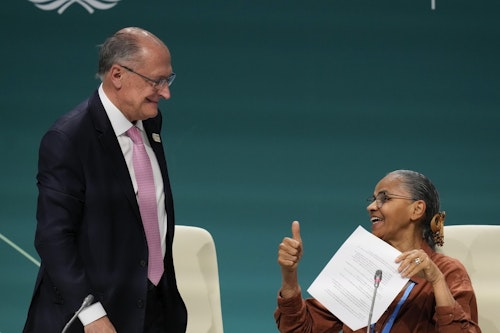
Brazil Vice President Geraldo Alckmin, left, speaks with Marina Silva, Brazil environment minister after a news conference at COP29. Credit: AP Photo/Rafiq Maqbool
"Brazil's new climate target shows that it is ready to tackle to climate crisis head-on, as long as the country strives for the highest end of its emission reduction target," says Karen Silverwood-Cope, climate director of WRI Brasil.
"Cutting emissions by 67 per cent by 2035 could put Brazil on a pathway to reach net zero by 2050."
On the other hand, Silverwood-Cope adds, if Brazil only meets the low end of its emissions target, the country could veer well off track on delivering its climate goals.
"As host for next year's climate negotiations, President Lula has a responsibility to lead by example and aim high."
Invest in adaptation and resilience to prevent more Valencia floods, says EIB president
A recent European Investment Bank (EIB) survey showed that 94 per cent of the EU population consider climate action a top priority. Investing in the prevention of climate disasters is a "no brainer" with one dollar invested in adaptation and resilience saving between five to seven in repairs and damages.
Euronews correspondent Jane Witherspoon spoke to EIB President Nadia Calviño in Baku to find out more.
Paying to prevent more floods is a “no brainer”, says EIB president
A recent EIB survey showed that 94 per cent of the EU population consider climate action a top priority.
Greenpeace fills oil execs garden with debris from deadly flooding in Brazil
Greenpeace Brazil and Greenpeace Nordic have placed debris from deadly flooding in Brazil around the home of Equinor oil executive Anders Opedal in Norway.
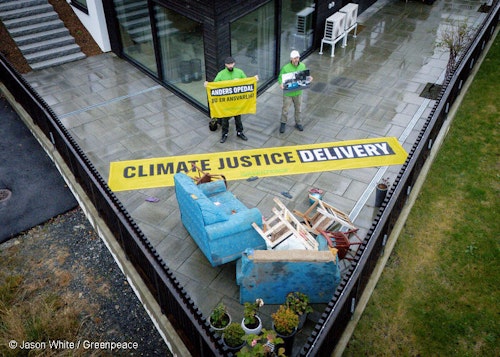
“I know it’s personal to show up at Opedal’s home, but it’s also personal to lose loved ones, flee your home and lose everything you own due to the destruction of the climate crisis. These items come from homes in Brazil that are now completely destroyed by extreme weather,” says Brazilian Greenpeace activist Claiton Wuaden Junior who was involved in the cleanup after the flooding.
Around half a million people were forced to leave their homes during the extreme weather event in Brazil earlier this year and 183 people lost their lives. It was the worst flooding the country has seen in over 80 years and climate scientists say global warming made it twice as likely and nearly 10 per cent more severe.
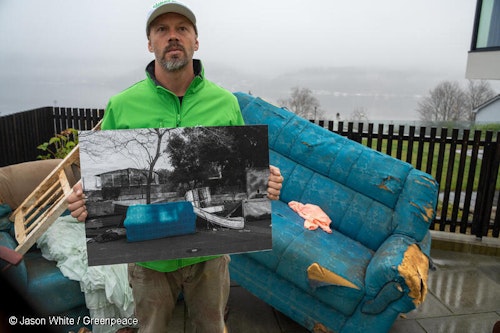
Greenpeace Nordic says it made thorough preparations to avoid any damage to the property and ensured no one was home before delivering damaged furniture and other flood remnants to the Equinor CEO's yard.
The activists claim that Equinors business is one of the major drivers of the climate crisis. As world leaders gather in Baku with finance a major focus, Greenpeace is calling for a global climate damages tax to ensure the fossil fuel industry is held accountable for the losses and damage caused by the sale of oil and gas.
'We cannot accept that our survival is merely an option'
Firsthand experiences of catastrophic weather fueled by climate change have been a striking theme among the speeches from world leaders at COP29 over the last few days.
Small island states had some of the strongest words for the rest of the world.
“If we leave climate action to the whims of political cycles, our planet’s future becomes precarious, very precarious,” said Prime Minister of the Bahamas Philip Edward Davis.
"We do not - cannot - accept that our survival is merely an option."
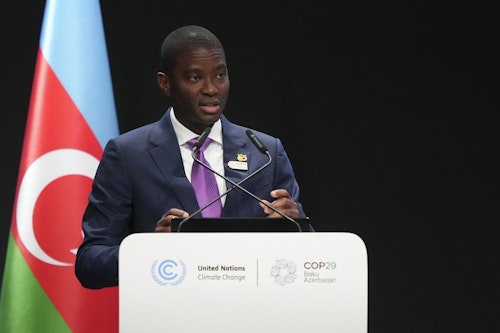
Grenada Prime Minister Dickon Mitchell speaks at COP29. Credit: AP Photo/Sergei Grits
Grenada's Prime Minister Dickon Mitchell described how 15 months of drought in his country at the beginning of 2024 were followed by Hurricane Beryl.
"At this very moment, as I stand here yet again, my island has been devastated by flash flooding, landslides and the deluge of excessive rainfall, all in the space of a matter of a couple hours."
While it may be small island developing states today, Mitchell added, it will be Spain or the US tomorrow.
But European countries haven't escaped the destruction of extreme weather this year either. Yesterday Spanish Prime Minister Pedro Sanchez described how more than 200 people were killed by flooding in his country late last month. Experts agree the heavy rains which hit Spain were intensified by climate change.
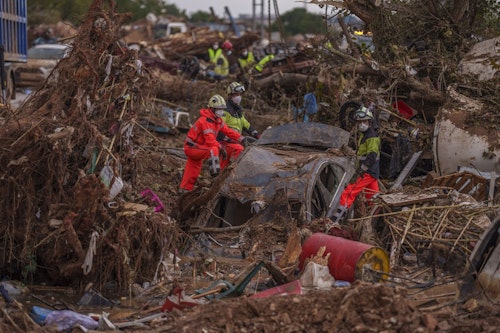
Emergency services remove cars in an area affected by floods in Catarroja, Spain. Credit: AP Photo/Manu Fernandez
Deadly heatwaves plagued Greece this summer. Prime Minister Kyriakos Mitsotakis said Europe and the rest of the world need to ask "hard questions" about the tradeoffs necessary to slow the crisis.
He also warned that Europe must dedicate more resources to responding to climate disasters.
"We cannot focus so much on 2050 that we forget 2024. We need more resources to prepare to respond in time, in order to save lives and livelihoods and to help people and communities rebuild after disaster."
COP29 After Hours: Day 2— From carbon pricing to Turkish coffee
Euronews reporters Jeremy Wilks, Giorgia Orlandi and Jane Witherspoon have been getting together after hours to share tips and news from the world's annual climate summit in Baku, Azerbaijan.
Yesterday the trio discussed everything from freebies and climate finance to Turkish coffee and the price of a tonne of carbon.
Grant, loan or investment: Are their strings attached to climate finance?
As talks on the finer details of deals and goals to be made at COP29 get underway, draft texts are starting to emerge.
But one big one is still missing - the New Collective Quantified Goal. This is the new finance goal that countries are set to agree at this summit. It will replace the previous goal of $100 billion (€91.4 bn).
Earlier this week we took a look at why finance is set to dominate this UN climate conference.
Grant, loan or investment: Are strings attached to climate finance?
Countries need to agree on a new collective quantified goal for climate finance in Baku. Here are the key fault lines.
Albanian PM goes off script to ask 'What on Earth are we doing?"
Prime Minister of Albania Edi Rama decided to leave his "well-prepared speech" behind this morning when addressing the summit.
"Since yesterday I was watching the silent TV screens in the leaders' lounge," he said. "People there eat, drink, meet and take photos together while images of voiceless speeches from leaders play on and on and on in the background."
"To me, this seems exactly like what happens in the real world. Every day life goes on with its old habits and our speeches, full of good words about fighting climate change, change nothing.
He noted how the UN secretary-general had said in his speech yesterday that carbon emissions increased last year instead of decreasing. Rama said ambitious goals had once again been postponed.
"In a world increasingly confused and deeply divided, I come here from a little country in the middle of Europe, Albania where we are proud to have 100 per cent renewable energy production. But what does it mean for the future of the world if the biggest polluters continue business as usual?," the Albanian PM asked.
"My point is, what on Earth are we doing, gathering over and over and over if there is no political will on the horizon to go beyond words and unite for meaningful action?"
Rama added that recently Albania has been blessed with the company of the European Union and for the first time, freedom, human rights and dreams have become a part of people's lives.
"But what is happening in Europe and around the world today doesn't leave much room for optimism."
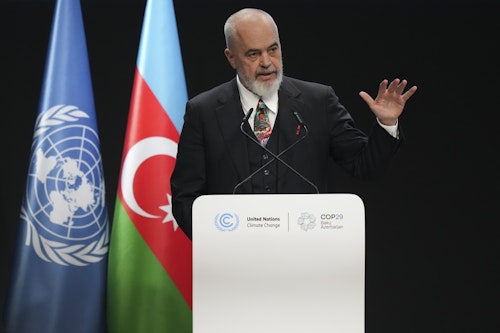
Albania Prime Minister Edi Rama speaks during a plenary session at COP29. Credit: AP Photo/Sergei Grits
Report finds emissions from fossil fuels once again rise to a record high in 2024
The world is on track to put 37.4 billion metric tonnes of carbon into the atmosphere this year - a 0.8 per cent increase from last year.
A new report from the Global Carbon Project has found that humanity will pump 300 million more tonnes of carbon dioxide into the air from burning fossil fuels than it did in 2023.
This annual increase isn't quite as big as the 1.4 per cent seen last year, scientists behind the report said while presenting it in Baku. But, if the world continues burning fossil fuels at the same level it is today, we have just six years left until we officially pass 1.5C of warming above pre-industrial levels.
“We clearly are not doing enough on a global scale to reduce emissions. It’s as simple as that,” said study co-author Mike O'Sullivan, a University of Exeter climate scientist.
"We need to massively increase ambition and actually just think outside the box of how we can change things, not be so tied to fossil fuel interests.''
'We have little time' says High Ambition Coalition
A statement has been released by the High Ambition Coalition (HAC)- an intergovernmental group of countries formed in the lead-up to Paris Agreement negotiations.
"We have little time," it reads, "In too many countries, the costs of climate change are already overtaking investments in its prevention and response."
The statement recognises the need for "trillions" of dollars of financing for climate action adding that developed countries must continue to take the lead and live up to existing funding commitments. It also lists slashing emissions, accelerating the transition away from fossil fuels and moving forward on adaptation efforts.
Signatories of the statement include a number of European leaders such as President of the European Commission Ursula Von Der Leyen, French President Emmanuel Macron, Prime Minister of Spain Pedro Sánchez, Prime Minister of Denmark Mette Frederiksen, German Chancellor Olaf Scholz and Robert Golob, Prime Minister of Slovenia.
The HAC reminds us that "the climate crisis has a disproportionate impact on women and girls, and they must be at the heart of solutions - from the COP process to the grassroots." Just eight of the 78 world leaders attending COP29 are women.
"Human rights are in the crosshairs of this crisis, and we must ensure that we uphold those rights, and ensure that the voices of all, including environmental and human rights defenders, women, indigenous peoples, and children and youth, are heard and respected."
"There is hope to be found," the statement says but it adds "The outcomes of COP29 - and every COP hereafter - must be judged by how we work together to advance these goals."
'It is up to us to determine whether this will be a success or a failure' - Meloni
Italian PM Giorgia Meloni has addressed the UN climate summit this morning. She and UK PM Keir Starmer are the only two G7 leaders in attendance.
She reminded delegates of goals set in Dubai last year to triple renewable energy and double global energy efficiency by 2030.
"Reaching this goal requires everyone's cooperation, starting with the major emitters of greenhouse gases."
Meloni pointed out that the world population will increase to 8.5 billion by 2030 and global GDP will double. No doubt this will come with increased energy consumption and the Italian PM said "gas, biofuels, hydrogen, CO2 capture" must all play a role.
She also cited nuclear fusion as a potential gamechanger which "could produce clean, safe and limitless energy" - though there is still a long way to go before this technology is truly feasible.
"Like any COP, it is up to us to determine whether this will be a success or a failure," Meloni added.
"We know that we may not benefit from the results of the efforts we are making but this is not the important thing. I am a mother and as a mother nothing gives me more satisfaction than when I work through policies that will enable my daughter and her generation to live in a better place."
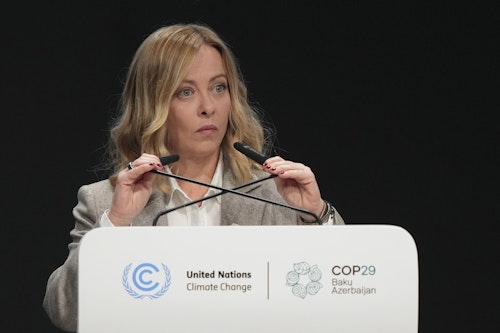
Prime Minister Giorgia Meloni adjusts the mic as she speaks during a plenary session. Credit: AP Photo/Sergei Grits
Good morning and welcome to day three of our live COP29 coverage. More world leaders are due to speak today in Baku on the final day of the World Leaders Action Summit. We'll be here keeping you up to date on what's going on at the UN climate conference so stay tuned.
If you missed any of the action yesterday take a look at our coverage from day two to catch up.
COP29: World leaders gather for day two of the UN climate conference
Euronews Green brings you the latest updates from the UN climate conference in Baku, Azerbaijan.










